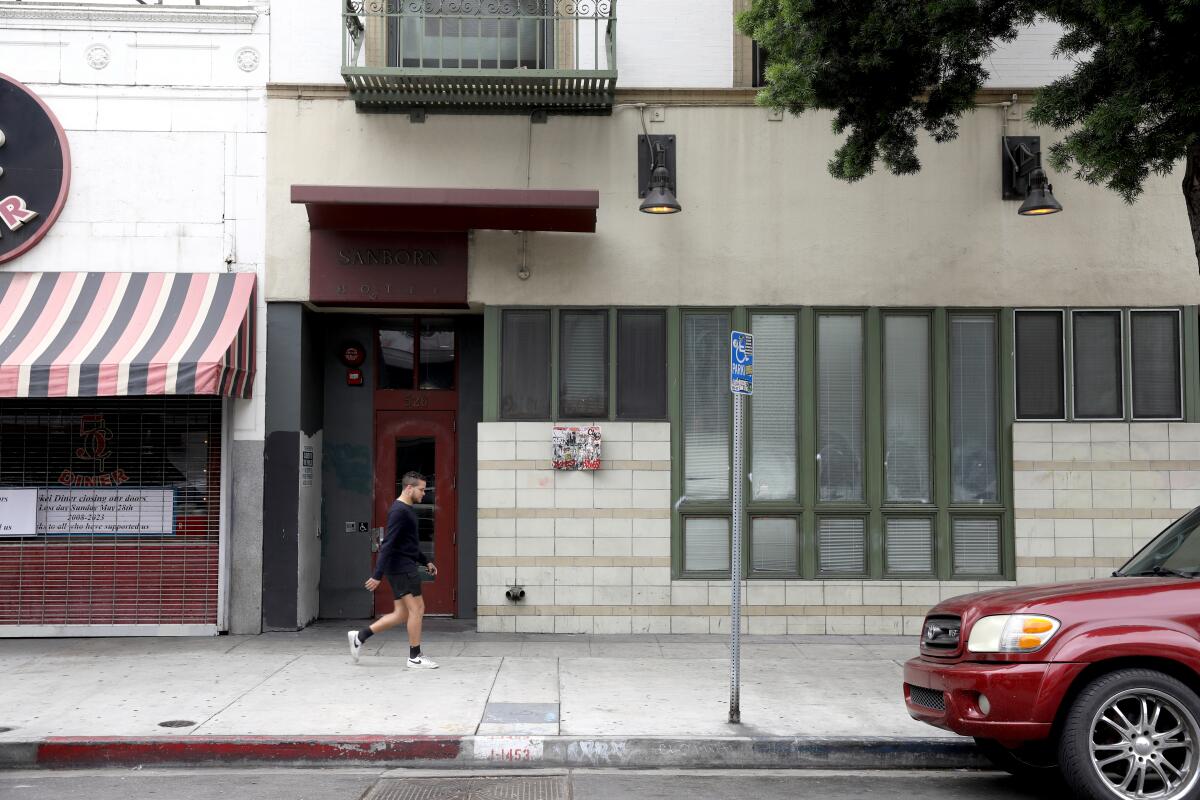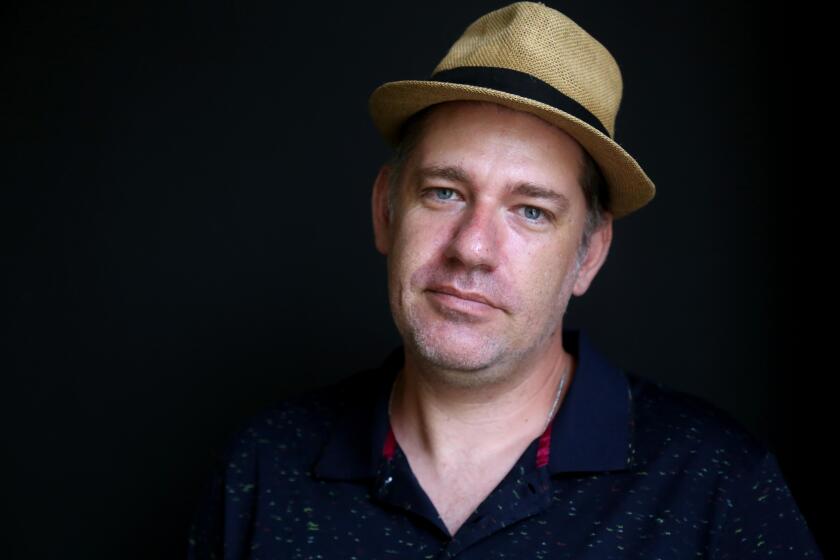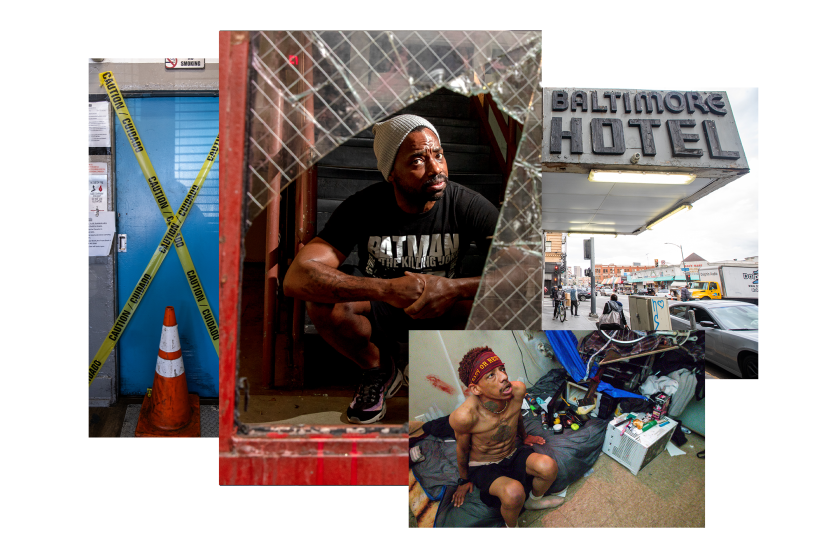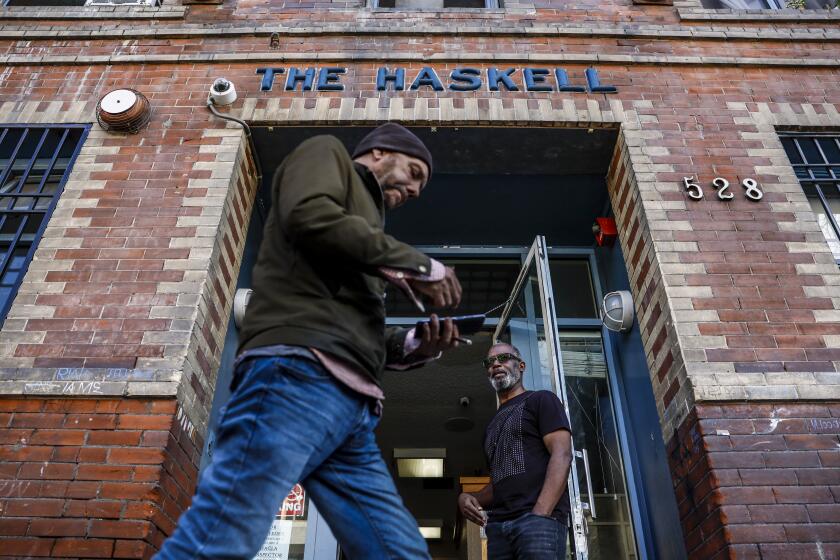Sale of massive Skid Row homeless housing portfolio approved by judge

- Share via
The sale of one of Los Angeles’ largest collections of homeless housing was approved by a judge Wednesday, marking a final step in averting a catastrophic loss of permanent shelter in Skid Row.
Los Angeles County Superior Court Judge Stephen Goorvitch said the $10-million purchase price for 17 buildings to be paid by Beverly Hills developer Leo Pustilnikov was in the best interest of formerly homeless tenants and L.A. taxpayers who had been financing the portfolio’s maintenance and repairs for 16 months.
“This is a solution that is the product of collaboration, hard work and checks and balances,” Goorvitch said. “Only time will tell whether this will be a success story, but I am optimistic.”
Goorvitch on Wednesday approved the sale of an additional building, the New Genesis, to KE Ventures, an entity affiliated with a Washington D.C.-based multifamily developer, for $2.1 million. Both deals are scheduled to close next month. Along with the earlier transfers of 11 other properties to nonprofit landlords, all 29 buildings previously controlled by the Skid Row Housing Trust have found new owners.
After a failed bid downtown a decade ago, developer Leo Pustilnikov is on the verge of a massive real estate deal in Skid Row, adding to his large portfolio across Southern California.
The trust was once considered a national model for taking old single-room occupancy hotels and small apartment complexes in Skid Row and rehabilitating them into supportive housing for homeless residents. But in February 2023, the nonprofit announced it could no longer pay its bills after years of leadership problems and financial challenges. The decision left its 2,000-unit portfolio in disarray as tenants, many of whom were elderly, disabled or dealing with drug addiction, faced broken plumbing and heating, vermin infestations and other terrible conditions.
Mayor Karen Bass, City Atty. Hydee Feldstein Soto and other city leaders pushed for a court-ordered receivership last year to oversee the portfolio and search for new owners. Without urgent action, they said at the time, more than a thousand people could be forced to the streets and a critical source of homeless housing would be abandoned.
The process has been costly and faced missteps. The first receiver chosen, Mark Adams, resigned under pressure after just three months after struggling with financing and management. The Times reported that the city did not fully vet Adams — who had hosted a political fundraiser for the city attorney and had a history of problems in other receiverships involving low-income tenants — before recommending him for the role.
The city’s bill for the receivership is at least $37 million, though some of that amount is expected to be repaid once the sales approved Wednesday close.
Recently, The Times has been investigating Skid Row’s troubled housing providers, digging into the failures of nonprofits such as AIDS Healthcare Foundation.
Identifying new owners has been challenging, for some of the same reasons that the trust failed. Many buildings are aging and need extensive repairs; federal housing subsidies haven’t covered growing monthly costs to operate them; the tenant population has grown more difficult as leasing practices prioritize those with mental health and addiction needs. Kevin Singer, the current receiver, said in recent court filings that some of the properties had such negative value that they couldn’t be given away.
Because of these problems, city leaders had originally pitched taking on the most troubled buildings and spinning them off to nonprofits that would demolish them and build new homeless housing in their place.
But that plan faltered in the spring as city and state budgets dried up. A deal for some of the remaining buildings with the AIDS Healthcare Foundation broke down in April amid concerns about the charity’s track record in Skid Row, disputes over providing tenants with social services and the foundation’s assertion that conditions in the buildings were worse than they had believed.
Pustilnikov, who had long been interested in the properties, emerged as a buyer in the aftermath. The developer is better known for his plans to leverage a state law to build 3,500 new apartments in Beverly Hills, Redondo Beach and other wealthy Southern California communities. His attempt to amass a large downtown portfolio alongside two wealthy investors a decade ago fell apart amid litigation.
For more than 100 years, single-room occupancy hotels have housed thousands of people in Skid Row. Now, L.A. leaders are saying their time has passed. Some fear losing them will displace their formerly homeless residents.
Pustilnikov has said that he’s stepping in to prevent worsening conditions in Skid Row and that he’s learned the complexities of financing and managing affordable housing in the neighborhood. He’s committed to maintaining social services for tenants, a key demand of Bass and the city.
“I would like to thank the city, county and state for their efforts in protecting this vulnerable population and I look forward to continuing to work with the mayor, City Council and County Board of Supervisors in turning around these challenging and neglected properties,” Pustilnikov said in a statement.
No formal opposition emerged to the sale, which Goorvich said was a significant factor in his approval following a 90-minute hearing in which he questioned city lawyers and the receiver. Goorvich said he was persuaded this decision would avoid an outcome that would threaten vulnerable tenants’ housing and that the city had sufficient regulatory authority to ensure the new owners would improve the properties.
“To put it in colloquial terms, something is better than nothing,” the judge said. “But I think this is a good something.”
Ann Sewill, general manager of the Los Angeles Housing Department, said after the hearing that she’s been impressed with Pustilnikov’s attention to the properties since he’s been engaged in the deal. She said he’s attempted to visit tenants units across the portfolio, asked detailed questions about building operations and has worked collaboratively with the city.
“We have a clear-eyed view of how to put these buildings back into financial and physical viability,” Sewill said.
More to Read
Sign up for Essential California
The most important California stories and recommendations in your inbox every morning.
You may occasionally receive promotional content from the Los Angeles Times.










